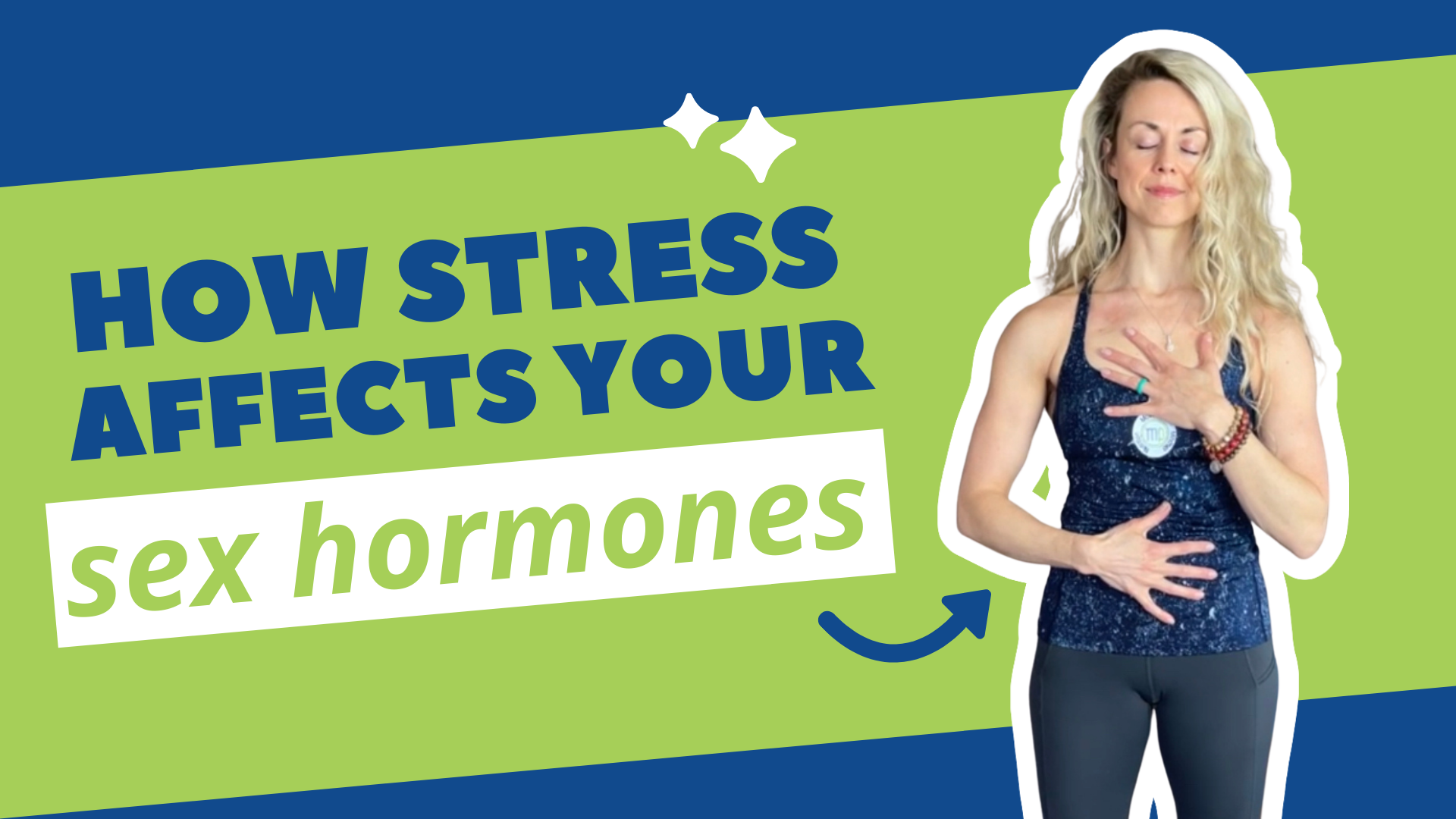Ever wondered why stress affects us the way it does? Dive into the intriguing world of the three stages of stress, where we unravel the science of your body’s HPA Axis and sympathetic nervous system activation. Discover these stages, learn how to identify them, and equip yourself with the tools to treat stress effectively.
Rather watch or listen?
How Stress Affects Our Body
Let’s start by discussing how stress affects our body. Stress can be categorized as both good and bad. Good stress, known as eustress, can be related to physical exercise or the excitement of an upcoming event, for example. Eustress plays a vital role in our performance, but today, we will focus on the three stages of stress and how acute stress can transform into chronic stress, impacting our bodies.
The HPA axis, short for the hypothalamic-pituitary-adrenal axis, is the body’s stress pathway. When we encounter a psychological or physical stressor, our limbic system, the brain’s emotional center, detects a potential threat. This sets off a series of events, with signals sent from the limbic system to the pituitary gland in the brain, which, in turn, signals the hypothalamus. The hypothalamus then prompts the pituitary gland to communicate with the adrenal glands.
The adrenal glands respond by releasing cortisol. If this stress continues for an extended period, it can lead to a persistent activation of the HPA axis. It’s crucial to understand that when the HPA axis is activated, it triggers the sympathetic nervous system, putting us in a fight-or-flight mode for survival.
When the sympathetic nervous system is upregulated, or the parasympathetic nervous system is downregulated, it’s like having the gas pedal pressed down continuously. The longer the HPA axis remains activated, the more our sympathetic nervous system stays in overdrive.
In 1963, Hans Selye pioneered understanding physiological responses to stress, a concept known as General Adaptation Syndrome.
Stages of Stress
Stage 1 – Arousal
Let’s examine a typical cortisol rhythm. Around 6 a.m. to 8 a.m., we experience the highest peak of cortisol, which gradually decreases as the day progresses, particularly as bedtime approaches when melatonin takes over.
In a stage one arousal state of stress, both cortisol and DHEA levels are elevated. DHEA is a crucial hormone associated with vitality, often called the “anti-aging hormone.” Initially, this response is entirely normal, resulting in episodic increases in both hormones followed by a return to baseline. Typically, in this state, you may not experience any symptoms, but you are stimulated, and there is a rapid release of catecholamines. This is essentially a natural and expected response.
This scenario applies when we encounter episodic stress throughout our day or life. The HPA axis and sympathetic nervous system become activated temporarily, but we ultimately return to our resilient baseline state. Everything remains well within the normal range.
Stage 2 – Adaptation
Now, this is where we are adapting to a higher cortisol point. This can manifest as elevated cortisol points at various times throughout the day or even persistently high cortisol levels, particularly in the morning. It’s not uncommon to wake up at two or three o’clock in the morning due to cortisol peaking prematurely.
In this situation, cortisol remains chronically elevated while DHEA levels start to decrease. This is when you might experience stress-related symptoms such as panic attacks, anxiety, depression, or feeling both tired and wired simultaneously. Instead of winding down for sleep at night, you find yourself with the energy to keep reading, cleaning, or tackling various tasks despite feeling tired.
Stage 3 – Exhaustion
So, think of it this way: if your adrenals have been pumping out cortisol for so long, then at some point, your body’s natural homeostasis is affected. At this point, cortisol is now low, and DHEA is low.
Various things typically occur in this stage, but you are likely to experience significant chronic fatigue. You’ll also notice more depression than anxiety, although anxiety can still be a significant part of it. Low blood sugar and glucose dysregulation are common patterns here.
When looking at a cortisol graph, there will be at least two to four points that are low on the cortisol rhythm. Normally, it starts up around 6:00 a.m. and gradually decreases throughout the day. However, in this case, multiple points are low. This can lead to symptoms such as fibromyalgia, dizziness, brain fog, inflammation, allergies, and even early menopause, which is another sign of stage three stress.
Other common symptoms are cravings for salty food, dizziness, and easy bruising.
Understanding the Stage of Stress You Are In
So, as you can see, each stage is very unique in its presentation. Some individuals may present with signs of stage two or stage three, which is common. However, I believe the first step I recommend is to try to better understand where you are. Simply identifying your stage is an excellent starting point for healing your body, and knowing that you can do it is important.
Your body is designed to heal itself, so when you start providing it with the things it needs and desires, you can significantly impact your health.
Tips for Overcoming Stress
Here are a few important tips, regardless of your stage. What stage are you in right now? Simply identifying it and understanding stress a little more is a great starting point.
Tip #1 – Focus on Your Nutrition
Focus on your nutrition! Especially if you are in stage three of stress, where you’re experiencing a lot of blood sugar dysregulation and low blood sugar in general, this is an area that you can really begin to eat every three to four hours. I would not recommend fasting in this situation. Instead, concentrate on balanced meals that include protein, healthy fats, and fiber sources, and consistently consume whole foods throughout the day.
Even if you find yourself in a slight caloric surplus, it’s important to note that most people I encounter are actually in a caloric deficit, which can contribute to more stress on the body.
So, keep in mind that the focus here is on whole foods and consistently eating high-quality nutrients. This approach aligns with my next suggestion: to ensure you’re replenishing nutrients. If you’re consuming very few calories or fasting, all of these practices can deplete your body with the essential nutrients needed for a healthy nervous system and stress mitigation, making you more resilient.
Therefore, emphasizing the intake of optimal nutrients and whole meals is a crucial step in managing stress.
Tip #2 – Nervous System Regulation
If you’ve read any of my blogs, you can see lots of different examples of this, but this can start with simply moving your body. This can be any type of breath work, movement, authentic movement, somatics, and vagus nerve exercises I have provided you. It could be anything to consistently regulate your nervous system in a healthy way. What are your triggers, and what things really are fulfilling you?
Tip #3 – Optimizing Sleep
I’ve written a few blogs on sleep, but here are some ideas: First, you want to think about down-regulating your nervous system to be able to go to sleep. Have a ritual before you go to bed. Wear blue light blockers if you’re using your phone, TV, or tablet because, in this case, it’s actually signaling to the receptors in your retina that it is morning time.
When you wake up, your ritual is even more important. You want to ideally try to get morning sunlight within the first 20 minutes of waking up. If that’s not possible, you can use a SAD light. It’s not as good as the sun, but it is a good backup plan so that there’s at least something in place that will help to increase your natural cortisol in the morning, and it will also help with the evening melatonin production.
So, consider everything you can do to optimize sleep.
Tip #4 – Supplementation
With this, the biggest take-home that I want to give you here is within each stage of stress, there are many different options. This will depend on your medical history, the stage of stress you’re in, and the types of things you are sensitive to—have you tried herbs, botanicals, or adaptogens? Have you had an issue with them in the past? There are so many variables. The first step is nutraceuticals, i.e., getting the nutrients that you are not getting through food.
Beyond that, you can get more specific in looking at different adaptogens that might be appropriate for your level of stress. For example, Ashwagandha is appropriate for all three levels of stress. That may not necessarily be the right thing for you, however. You do want to check with your doctor, functional medicine provider, or dietitian to ensure it is.
There are so many things you can do to begin to pave the way for a more resilient nervous system, a healthy body, and a healthy mind.
If you found this information helpful, please like, share, and subscribe to our YouTube channel, The Movement Paradigm®, for weekly tips on mindset, nutrition, and movement. If you want to join our app and join our community, please make sure to check out the Movement Paradigm app on Google or Apple.
To learn more about how we can assist you on your journey, please don’t hesitate to reach out for a discovery session. We look forward to helping you on your path to wellness.
Other things that might interest you:


